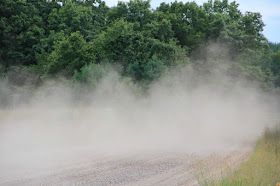 |
| by the roadside, left in the dust
Photo by J. Harrington
|
American ClassicIt’s a classic American scene—a car stopped off the roadand a man trying to repair it.The woman who stays in the carin the classic American scenestares back at the freeway traffic.They look surprised, and ashamedto be so helpless…let down in the middle of the road!To think that their car would do this!They look like mountain peoplewhose son has gone against the law.But every night they set out foodand the robber goes skulking back to the trees.That’s how it is with the car…it’s theirs, they’re stuck with it.Now they know what it’s like to sitand see the world go whizzing by.In the fume of carbon monoxide and dustthey are not such good Americansas they thought they were.The feeling of being left outthrough no fault of their own, is common.That’s why I say, an American classic.
If you've read any of the recent books purporting to explain the last presidential election, Hillbilly Elegy and "Strangers in Their Own Land" come to mind, the "feeling of being left out" should resonate. Perhaps, if you've read either version of Heinlein's "Stranger in a Strange Land," or Le Guin's "The Left Hand of Darkness," you've thought about the question of how much, and what, must we have in common with others to accept them as being "like us."
Simpson's poem also raises questions about the pros and cons of technology and technological dependence. According to Clarke's Third Law: Any sufficiently advanced technology is indistinguishable from magic. And then, as William Gibson is reported to have observed "The future is already here — it's just not very evenly distributed." Does FaceBook or Google know more about you than you do yourself? How does one safely exit a slippery slope?
Once repairs required but a modicum of mechanical knowledge, access to replacement parts, and an ability to handle tools. Now, from tractors to computers and "smart"phones, we seem no longer to own what we have "purchased." Our possessions can only be repaired at "authorized" locations, to protect the "intellectual property" of the manufacturers. As our digital, and economic, divide continues to grow, will that further lead to additional technological dependency which furthers corruption of our identity as individuals and our common identity as a society? How many of us may become, of necessity, a "son who has gone against the law?" Would an old fashioned barn raising have been successful if it required a "user license?" Is the poem correct, that we're "stuck with it?" Has Hoagland laid down another cautionary road block?
********************************************
Thanks for visiting. Come again when you can.
Please be kind to each other while you can.
No comments:
Post a Comment